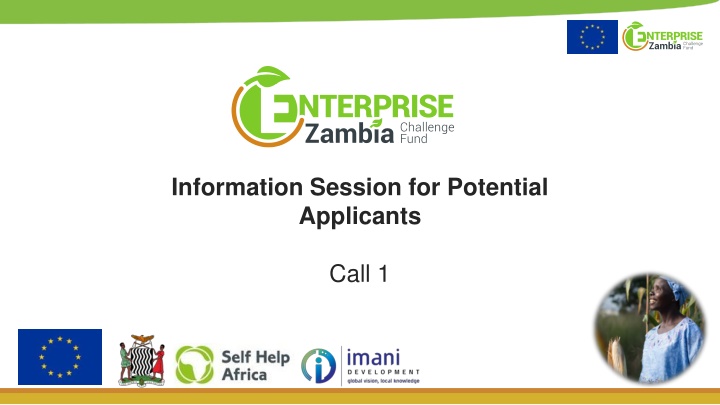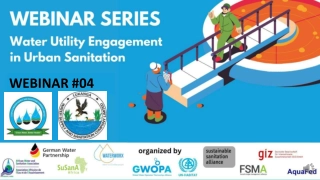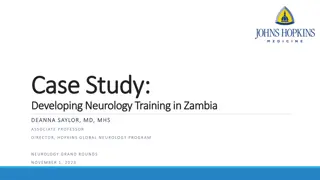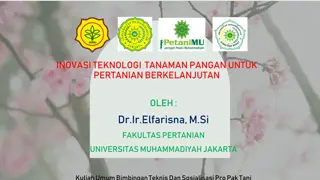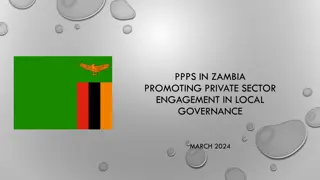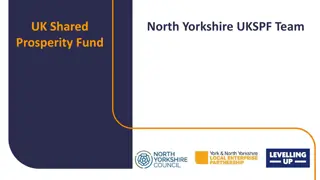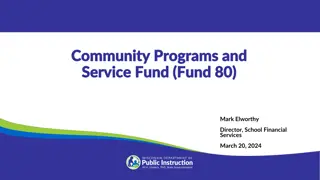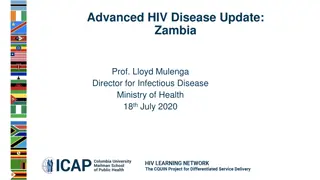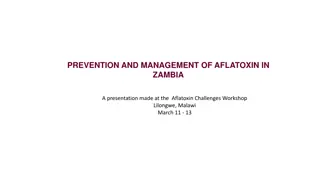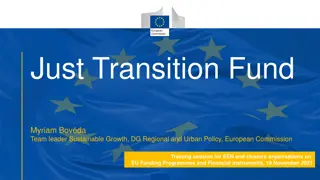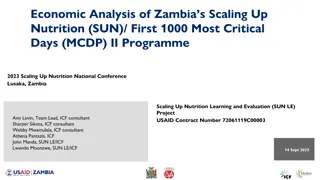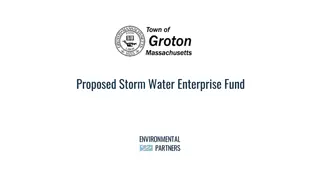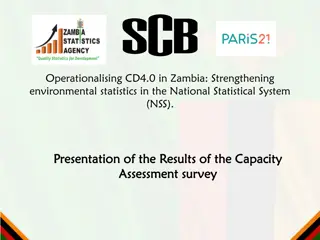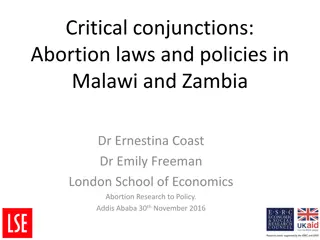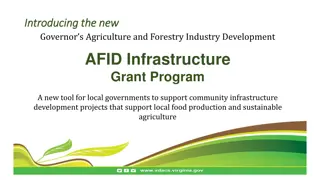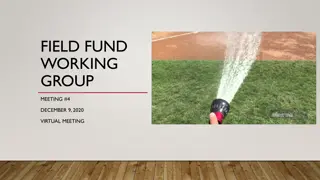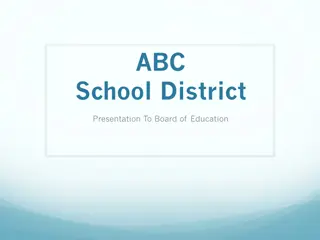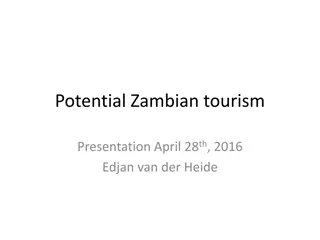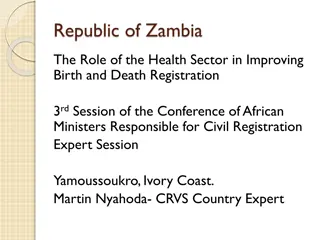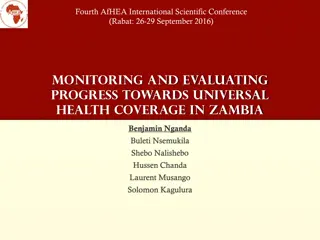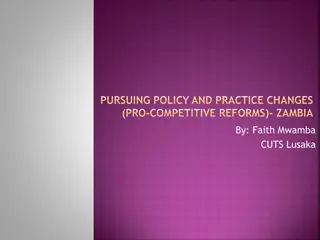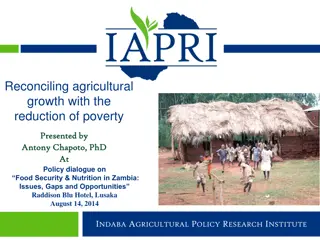Enterprise Zambia Challenge Fund - Supporting Sustainable Agriculture
Enterprise Zambia Challenge Fund, implemented by Self Help Africa with support from the European Union and the Government of Zambia, aims to integrate smallholder farmers into sustainable value chains in Zambia. The project provides economic, nutrition, and technical support to agri-enterprises, with a focus on improving economic returns and profitability for farmers. Self Help Africa, an international NGO, is dedicated to supporting sustainable livelihoods for smallholder farmers in Africa through initiatives in food security, agri-enterprise development, and climate-smart agriculture.
Download Presentation

Please find below an Image/Link to download the presentation.
The content on the website is provided AS IS for your information and personal use only. It may not be sold, licensed, or shared on other websites without obtaining consent from the author.If you encounter any issues during the download, it is possible that the publisher has removed the file from their server.
You are allowed to download the files provided on this website for personal or commercial use, subject to the condition that they are used lawfully. All files are the property of their respective owners.
The content on the website is provided AS IS for your information and personal use only. It may not be sold, licensed, or shared on other websites without obtaining consent from the author.
E N D
Presentation Transcript
Information Session for Potential Applicants Call 1
Outline Outline ENTERPRISE Zambia Challenge Fund Challenge Fund Partners Expected Results Nature of Support Self Help Africa Financial Support Highlights Eligible Actions Who is eligible Match Funding Eligible costs Concept Notes Assessment Criteria Application Process Fund Process Q & A
This project is implemented by Self Help Africa with technical support from Imani Development Ltd, and funding from the European Union and the Government of Zambia. www.enterprisezambia.org info@enterprisezambia.org
ENTERPRISE Zambia Challenge Fund ENTERPRISE Zambia Challenge Fund Economic, Nutrition and Technical support for increased Economic Returns and PRofit In SustainablE agribusiness in Zambia European Union EUR 26 million support to agri-enterprises in Zambia Objective To integrate smallholder farmers and fish-farmers into sustainable value chains Duration 5 years (2020-2025)
Self Help Africa Self Help Africa We are: International Non- Governmental Organization Headquarters in Dublin Ireland Where we work: 9 countries in Africa Zambia since mid-80s Mission: To support sustainable livelihoods for Africa s smallholder farmers
Self Help Africa Self Help Africa What we do Food, Nutrition and Income Security K K Agri-Enterprise Development Influence and Awareness Cross-cutting themes Climate Smart Agriculture Technology and Innovation Gender and Inclusion Youth
Partners Partners European Union Government of the Republic of Zambia Fund Managers Fund Managers Self Help Africa Imani Development
Why ENTERPRISE Zambia Why ENTERPRISE Zambia? ? Addressing missing middle Catalyse investment in inclusive business models in value chains with thousands of smallholders as customers or suppliers. Farm to Fork & EU Green Deal supports goals to improve sustainability of food systems in the face of climate change.
Expected Results Expected Results 40 - 45 agri-enterprises supported 25% turnover 150,000 SHF better integrated into sustainable value chains 8,500 net equivalent jobs created 90% increase in smallholder marketed produce 70% of SHF using climate-smart agriculture 650,000 improved livelihoods Positive impact on cross cutting issues of gender, youth, nutrition and environment considerations
Nature of Support Nature of Support Financial Support: To support investments where agri-enterprises have blockages or weak links with smallholder farmers. Technical Assistance: To improve business capacities for growth and improved service delivery to farmers for sustainable production and adaptation to climate-smart agriculture.
EU Green Deal EU Green Deal Initiatives aligned with EU Green Deal strategies to support a green economy: EU Farm to Fork strategy EU Biodiversity strategy EU Circular Economy Action Plan
EU Farm to Fork EU Farm to Fork The EU Farm to Fork Strategy aims to accelerate our transition to a sustainable food system: neutral or positive environmental impact mitigate climate change and adapt to its impacts reverse the loss of biodiversity ensure food security, nutrition and public health = everyone has access to sufficient, safe, nutritious, sustainable food preserve affordability of food while generating fairer economic returns, fostering competitiveness in supply and promoting fair trade
Biodiversity Strategy: Interventions Biodiversity Strategy: Interventions Preserve and restore ecosystems and biodiversity through: Organic farming healthy food Halting and reversing the decline of pollinators - yield gains Planting trees and promoting agroforestry Reducing use and risk of pesticides
Circular Economy Action Plan Circular Economy Action Plan Move from a linear to a circular economy through: Making sustainable products the norm Empowering consumers and buyers Focusing on sectors that use most resources and where potential for circularity is high such as packaging, food, water and nutrients Minimising waste Making circularity work for people, regions and cities
Eligible Actions to be Supported Eligible Actions to be Supported 1. Initiatives resulting in positive impact on smallholder farmers/fish-farmers, including those that; Improve productivity Increase market access Improve post-harvest handling Enhance food safety Support Covid-19 adaptation & mitigation 2. Initiatives that support business processes towards farmer integration
Eligible Actions: Productivity Eligible Actions: Productivity Example Focus Example Focus Initiatives that enable smallholder farmers to improve Example investments Example investments Extension services and training Pre-harvest and post-harvest small/medium scale infrastructure and processing. agricultural productivity - livestock, aquaculture, agroforestry (with a focus on commercialisation of Agroforestry Tree Products (AFTPs) and/or non-wood forest products NWFP) Adding value to primary agricultural, aquaculture, agroforestry produce Aggregation, sourcing transparency, adding value to, and marketing of primary agricultural produce market access, Local level infrastructure: warehouses, cold storage, cold chain transport, etc. inputs and services, post-harvest handling and food safety, Supply of equipment and/or (greener and ecological) inputs other impacts can be proposed. Strengthening existing Associations, Cooperatives, etc Uptake of and adherence to food safety quality standards and/or certification of products.
Eligible Actions Eligible Actions: sustainable agro : sustainable agro- -food systems food systems Example investments Example investments Climate smart approaches both at farm and agribusiness level; Reducing food losses - packaging and distributing crops and food using re-usable and recyclable packaging materials; Renewable energy and circular business models in food and biomass fuel processing and retail. Improving water utilisation efficiency e.g. by promoting drip irrigation using sustainable water sources; Incentives for biodiversity conservation and socially responsible production and marketing. Biodiversity - supporting organic farming, halting the decline of pollinators, agroforestry practices, wildlife habitats, etc.; Reducing pesticide use and promoting biological methods of pest and disease control; Reducing inorganic fertiliser use and promoting organic alternatives; Promoting sustainable land use management practices to minimise land degradation and nutrient loss; Reducing antimicrobials use in animal production and aquaculture.
Eligible Actions: Covid Eligible Actions: Covid- -19 adaptation & mitigation 19 adaptation & mitigation Example investments Example investments Technology-based solutions for supporting aggregation, tracking movement of goods and enhancing crop traceability and last mile delivery; Packaging and disseminating information to prevent or reduce covid-19 infections and transmission; Establishing produce collection centres to minimise travel by smallholders; Warehouse and processing plant re-engineering to enhance social distancing; Promoting e-commerce trading solutions and use of ITC solutions to minimise physical contact/movement through the supply chain with aim at bringing smallholders closer to the market; Using plant oils and sugarcane wastes to manufacture soaps and sanitisers.
Who is Eligible Who is Eligible? ? An agri-enterprise registered in Zambia and compliant with all national laws and regulations Evidence of current or future integration of SHF/Fish-Farmers in existing or new value chains Must be a for-profit entity and be willing and able to contribute at least 50% of the project cost At least three (3) years of uninterrupted operations with annual turnover of at least EUR 150,000 evidenced by audited accounts
Exclusion Criteria Exclusion Criteria Any lead applicant or its implementing partner(s) will be excluded from participation in this programme if: It is bankrupt/insolvent/under liquidation or winding up procedure Business operations are suspended or in a scheme of arrangement with creditors It is in breach of its obligations relating to payment of taxes or social security contributions It is guilty of fraud, corruption, conduct related to a criminal activity, terrorist related offences or financing, money laundering, child labour or other offenses concerning trafficking in human beings It has shown significant deficiencies in performance of a contract or agreement financed by the European Union Budget which led to termination or penalties It is guilty of grave professional misconduct by violating applicable laws The agri-enterprise, advisors or principals were previously involved the preparation of the call documents for the ENTERPRISE Zambia Challenge Fund It has/is entering into agreement with other economic operators with the aim of distorting competition
Financial Support Details Financial Support Details Financial Allocation: EUR 20.8m in 3 calls, Approximately EUR 7m per call Aquaculture: EUR 6m dedicated to fish farming over 3 calls Size of Financial support: Min EUR 150,000 Max EUR 1million Support max. 50% of project size and balance matched by applicants Project support duration: 24-30 months
Match Funding Match Funding Own Resources Cash Cash equivalents External Financing Credit Equity Above can be provided by the lead applicant or consortium partner
Excluded Costs Excluded Costs Debts and debts service charges (interest); Provisions for losses, debts or potential future liabilities; Costs already supported by EU action or program Purchases of land or buildings: Currency exchange losses; Credits to third parties (including input credit) Salary costs of the personnel of national administrations
Fund Process Fund Process Call for Concept Notes Concept Notes Screening Concept Notes Approval Submission of Full Proposal Full Proposal Evaluation Full Proposal Approval Contracting
This project is implemented by Self Help Africa with technical support from Imani Development Ltd, and funding from the European Union and the Government of Zambia. www.enterprisezambia.org info@enterprisezambia.org
Concept Note Assessment Criteria Concept Note Assessment Criteria COMMERCIAL DRIVERS/VIABILITY Business Growth Prospect Revenue and profit prospect Max. of 40 points Max. of 20 points 10 Market prospect 10
Concept Note Assessment Criteria Concept Note Assessment Criteria COMMERCIAL DRIVERS/VIABILITY Business Capacity Max. of 40 points Max. of 20 points Internal capacity 5 Financial health of the agri-enterprise 5 Business risk identification and mitigation capacity 5 Covid-19 Resilience 5
Concept Note Assessment Criteria Concept Note Assessment Criteria SOCIAL IMPACT Max. of 35 points Farmers integration 15 Job creation 10 Household resilience 5 Outreach to underserved provinces 5
Concept Note Assessment Criteria Concept Note Assessment Criteria SUPPORTING A GREEN ECONOMY Max. of 30 points Farm Level Climate Smart Practices 15 Agri-Enterprise Level Climate Smart 15 adaptations
Concept Note Assessment Criteria Concept Note Assessment Criteria ADDITIONALITY, SUSTAINABILITY AND REPLICABILITY Max. of 10 points Demonstration that the project would not proceed without ENTERPRISE Zambia Challenge Fund financial support, sustainable and easily replicable 10
Concept Note Assessment Criteria Summary Concept Note Assessment Criteria Summary CRITERIA SCORE COMMERCIAL DRIVERS/VIABILITY 40 SOCIAL IMPACT 35 SUPPORTING A GREEN ECONOMY 30 ADDITIONALITY, SUSTAINABILITY AND 10 REPLICABILITY TOTAL SCORE Max. score 115 points
Application Process Application Process Call for Proposal now open Login Follow link to Register Visit. instructions sent www.enterprisezambia.org www.enterprisezambia.org Login and complete Concept Note Sign T&Cs and Submit You will get mail notification when you Submit Your Concept Note NB: You have till 3rd October to update your Concept Note
Section 1: Business Details of Lead Applicant Section 1: Business Details of Lead Applicant Business Name Type of Registration Registration Number Year of Registration ZRA TPIN Number Email Address Physical Address Phone Website
Contact Person Name : Email Address :Phone Number Core industry Position in the Value Chain Years of Business Operation Towns where you buy/ supply agricultural produce/services Implementation Partners Business Name Type of Registration Years of Business Operations Districts where you buy/ supply agricultural produce/services
Section 2: Description of Current Business Section 2: Description of Current Business a). Business Description i). Provide a brief description of your business profile detailing, core activities, products/services and market. ii) How are you currently working with farmers (Describe the services and activities the business is providing to and/or engaging smallholders/fish-farmers on) b). Business Ownership (Describe the ownership structure of the business and subsidiaries (if applicable)) c). Management (Provide a brief description of the management and governance process of the business, qualifications and gender of key governance and management staff, the financial management processes) d). Covid-19 (How has the current crisis impacted on your business and the value chains you operate in?)
e). Financial History in EUR ( Provide details of your financial position for the last three years) Financial year Annual turnover EBITDA Net profit / loss Total Asset Value Total outstanding amount of loans Please provide a commentary on your financial history also highlights sources of your business finances over the past 3 years Year 1 Year 2 Year 3 f). Who is your current auditor? No. of years with auditor ZICA Certificate Number Name
Section 3: Project Description Section 3: Project Description Describe your project a) Proposed solutions and key project activities b) Market prospects c) Contribution to your business d) Covid-19 Adaptation
Average exchange rates to use (Euro Info) Apr to Mar ZMW/Euro Jul to Jun ZMW/Euro Jan to Dec ZMW/Euro 2019/20 2018/19 2017/18 2016/17 14.91 12.67 11.11 10.99 2019/20 2018/19 2017/18 2016/17 16.27 13.27 11.47 10.66 2020 2019 2018 2017 18.09 14.35 12.25 10.70 e) i) Projected annual turnover in Euros Year 1 Year 2 Year 3 ii) Projected Earnings Before Interest Tax Depreciation and amortization in Euros Year 1 Year 2 Year 3 f) Projected assets value in Euros Year 1 Year 2 Year 3
g) Cost of project in Euros Co-financing Total Financial Support Requested (ENTERPRISE Zambia Challenge Fund) Third Party Funding/External Financing Total Project Cost Own Contribution EUR EUR EUR
h) Project Risk (Detail critical risk that may affect the project and brief mitigation strategy Probability (unlikely/ likely/ certain) medium/ high) Impact (low/ Risk Mitigation plan
Section 4: Social Impact Section 4: Social Impact a) i. How will your project integrate smallholders/fish-farmers into the value chain? ii. How will the project increase annual smallholders/fish-farmers household income and marketed volumes of products/services? Illustrate using realistic figures b) How many smallholders/fish-farmers are you currently reaching? Male Adults Male Youth Female Female Youth Adults Current c) What is the projected numbers of farmers to be reached by the intervention? New farmers Male Adults Male Youth Female Female Youth Adults d) What is the projected total hectarage under production by the targeted farmers?
f) How will your project contribute to direct job creation? What is the current number of staff employed by the company? Male Adults Male Youth Female Adults Female Youth What is the targeted number of job to be created by the business? Male Adults Male Youth Female Adults Female Youth What are the proposed opportunities for indirect job creation by the project?
g) How will your project enhance food and nutrition security among the smallholders/fish-farmers households? h) Will the project be implemented in under-served districts in the poorest provinces, e.g. Western, Northern, Luapula?
Section 5: Supporting a Green Economy Section 5: Supporting a Green Economy a). How will your business promote climate smart practices at the smallholder level and in sourcing from smallholder farmers/ delivery of services to smallholder farmers? How will you promote climate smart adaptation at the Agri-enterprise level? b) Provide approximate number of current and projected hectarage under climate smart practices Number of farmers Hectarage Current Projected
Section 6: Sustainability, Replicability and Additionality Section 6: Sustainability, Replicability and Additionality a). Describe how your company plans to ensure project sustainability and replicability after the project period. b) Additionality would your project proceed and be sustainable without ENTERPRISE Zambia Challenge Fund financial support?
Summary Summary EZCF is looking for proposals which: Have a positive or neutral impact on the environment Integrate small holder farmers into commercial value chains either as suppliers or customers Support Covid-19 adaptation & mitigation Projects that are commercially viable and able to create jobs.
Thank You Q&A
Tips for a strong proposal Tips for a strong proposal Read the Guidelines and read them again understand the scoring, stick to word limits Sensible and realistic projects underpinned by a clear commercial analysis. Projects should build on current business in a coherent way. Clarity in the project description is important. Use data and evidence to support claims on markets, benefits, issues that need addressing in the value chain. The lead applicant is responsible for the Co-applicant. Due diligence will also be done on the Co-applicant. Clearly explain who is doing what and why, and why you are working together. Clearly explain integration process for smallholders. Examples: Guaranteed markets for farmers, Contracts with farmers, registry or database of farmers as suppliers or customers etc. Explain how (and how much) money will be put in the farmers and workers pockets.
Tips for a strong proposal Tips for a strong proposal Be realistic about timeframes and what can be achieved. When will results be seen? Think about the project activities and budget from the outset. Ensure there is a sharing of risk in financial request - between applicant and partners, applicant and grant fund i.e. cost of establishing a collection centre. Identification of project risk and mitigation measures is important demonstrate you understand and can manage your risks. Emphasis on mandatory compliance requirements which include; Audited accounts Tax compliance Operational licenses i.e. EPZ licenses
Tips for a strong proposal Tips for a strong proposal Provide models, assumptions or evidence to support targets for jobs, farmers reached, area under improved practices. Provide realistic disaggregated data on male/female/youth, direct/indirect jobs (sustained/created), current/projected etc. Make the case for why and how your project will support green economic growth back with data. Sustainability, replicability and additionality is important. Can benefits operate beyond the life of the project, it can be implemented elsewhere Why deserving of the financial support? Why should they be funded? Would it have happened anyway? Why now?
